Both Savannah and Viverral are originated from United States. Both Savannah and Viverral are having almost same weight. Savannah may live 5 years more than Viverral. Both Savannah and Viverral has same litter size. Both Savannah and Viverral requires Low Maintenance.
Basic Information
undefined
United States
United States
Life Span:
14 - 20 Years
10 - 15 Years
Colors Available:
grey with black spots, cream, Tawny
Cream, black, tan - spots
Coat:
Short
Short and plush
Temperament:
Affectionate, Alert, Cheerful, Curious, Energetic, Friendly, Independent, Intelligent, Lively, Loving, Loyal, Outgoing, Playful, Responsive, Social, Territorial
Affectionate, Aggressive, Alert, Cheerful, Curious, Energetic, Friendly, Independent, Intelligent, Lively, Loving, Loyal, Outgoing, Playful, Responsive, Social, Stubborn, Territorial
Grooming:
Low Maintenance
Low Maintenance
New Owners Friendly:
Yes
Yes
History
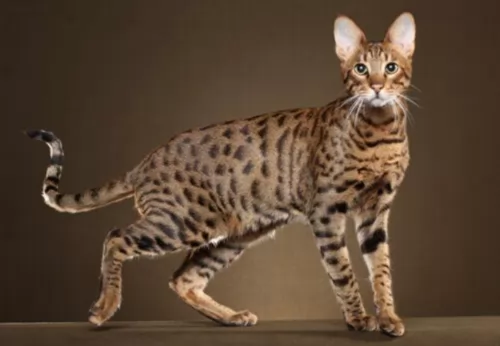 Savannah cats have been bred to look like a Serval but it is essentially a domestic cat. The first Savannah cat was born in the United States in April 1986. The person who was successful in making this happen was Judee Frank.
Savannah cats have been bred to look like a Serval but it is essentially a domestic cat. The first Savannah cat was born in the United States in April 1986. The person who was successful in making this happen was Judee Frank.
She bred a Serval wild cat and a Siamese cat and they produced a female kitten with the name of Savannah – named after the African savannas from where the serval cat comes from.
It will take your Savannah kitten about 3 years to reach his adult size. The Savannah will give birth to up to 6 kittens. The cat was recognized by TICA in 2001.
Today when you’re looking to buy a Savannah kitten, you’ll notice the cats are always described with a filial number, for example, F1, F2, F3, F4, and so on. The filial number describes the generation a cat comes from.
Because this cat belongs to a hybrid group, the feline is banned in a number of states and cities in the United States of America.
This is a rare cat breed and therefore not much information on it is available.
It does seem that in 2002, a 5th generation Viverral was developed and this established the breed.
The cat is described as a fishing cat hybrid. A breeding program was started but it is thought that the cat became extinct.
Description
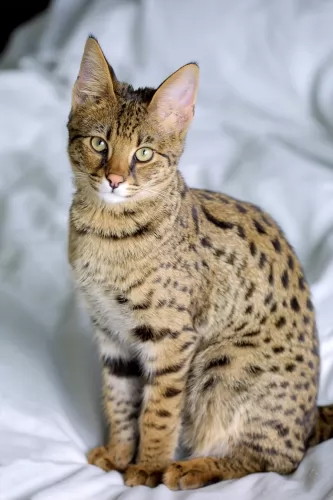 The Savannah Cat is a fairly large cat that weighs anything from 3 to 8 kg. It is a cross between a domestic cat and one of Africa’s smaller wild cats, the Serval.
The Savannah Cat is a fairly large cat that weighs anything from 3 to 8 kg. It is a cross between a domestic cat and one of Africa’s smaller wild cats, the Serval.
Because of the Serval in the mix, the Savannah cat is able to leap into the air too because of his long legs. The cat has a short tail, and similar to the Cheetah has tear markings running from the corner of the eyes down to the whiskers.
A striking feature of this cat is his hooded eyes and the large ears. The Savannah cat has exotic looks and is regarded as a low maintenance cat with its short fur. The coat is tawny-colored with black spots but it comes in 4 background colors – smoke, silver, brown, and black.
Temperament:
An interesting aspect with the Savannah Cat is that they are sometimes compared to dogs. They become loyal pets and companions and will follow their owners around and can even be trained to walk on a leash.
The Savannah is an intelligent cat and can be taught a trick or two. Because the Savannah cat is a hybrid, they aren’t predictable in nature. Some are friendly and social while others are more wild and hostile. Some of them don’t like meeting strangers and will growl and hiss with uncertainty.
They enjoy playing in water and it will be a good idea to invest in a paddling pool for this cat’s outdoor enclosure. It’s an active cat and will require daily exercise. It is better suited to homes where there are older children.
The Viverral is muscular and substantial. He has a smallish head and smallish ears with a thick tail.
The coat is spotted. The base color of the coat and the spots should be different. The light cream underbelly is also spotted.
Large, muscular, and solid, the cat’s eyes are big and round in the smallish heald. The coat is short and plush with a spotted pattern of black, brown or tan spots.
Temperament:
The Viverral cat has been designed to produce friendly kittens that are curious and confident. They turn out strong and confident and are suitable as house cats.
New cat owners might have success with them and they can even be friendly with children in the home, but the truth remains, they are unpredictable.
Beautiful and something unique, it is not likely though that this cat breed would have wanted to be cuddled and petted by his human owners.
Characteristics
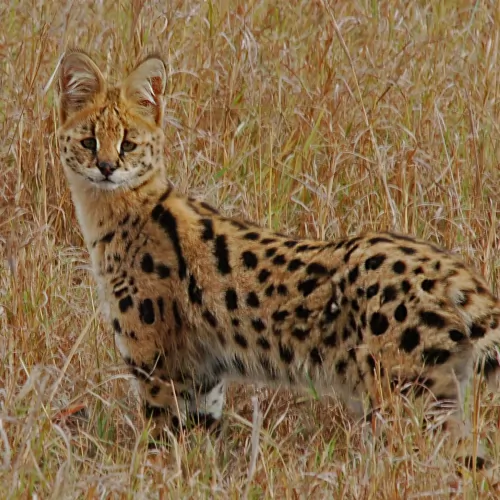 The Savannah cat's temperament is exceptional, and when you’ve got a Savannah in your home, you’ve got a true companion.
The Savannah cat's temperament is exceptional, and when you’ve got a Savannah in your home, you’ve got a true companion.
Cat lovers who have owned one of these cats will tell you that this cat is similar to a dog in many ways. The intelligent cat will follow his owners around and be a friendly, loyal, and devoted companion.
With so much intelligence, beauty, and energy, this cat has all the qualities of a splendid feline companion.
The Savannah will form a particularly strong bond with the human family member who grooms and feeds him.
Everybody who has known the social, affectionate, loyal cat has nothing but good words to say and he may just be the cat companion you want.
Hybrid cats such as the Viverral can look quite a bit like a wild cat and this is what first appeals to cat lovers. They want an exotic cat to brag about.
However, these cats can come up with a whole lot of behavioral problems so that you wish you had never got one. One should just go along to some of the many cat shelters there are to discover how many hybrid cats land up there.
They turned out to be a disappointment – their behavior wouldn’t conform to what their human family expected of them. This is the story of hybrid cats. Humans want some exotic looking animal to please their greedy natures and then when the cats don’t behave the way they should, they get rid of them. Rather, it is humans that need to change their behavior and leave wild animals alone.
The Viverral can have their good side and be splendid pets but they aren’t consistent. They have a streak of unpredictability, and they also have issues with the use of a litter box.
They mark their territory too and can show some aggression. Any animal with a wild side isn’t going to make the best pet, but still, some cat lovers have managed to bring out their best side.
Health Problems
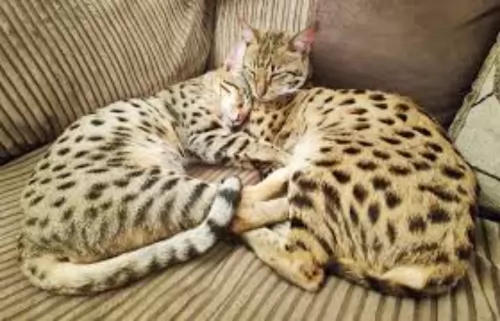 The Savannah is generally a healthy cat. The cat can also fall prey to some of the typical cat illnesses there are -
The Savannah is generally a healthy cat. The cat can also fall prey to some of the typical cat illnesses there are -
Allergies:
Allergies happen with cats when their immune systems become sensitive to certain things. Cat allergies can be environmental, from fleas or from food allergies.
While some allergies may come and go, others will require an examination by the vet as they can include itchy skin problems. Typical allergy symptoms include sneezing and coughing, runny eyes, diarrhea and vomiting.
Irritable bowel disease:
This is a gastrointestinal disorder. Cats of any age are affected but it is found more in older cats. Chronic inflammation of the gastrointestinal tract can come about because of a food allergy for instance or parasitic or bacterial infection. Your Savannah cat will be vomiting and lethargic and have diarrhea and weight loss.
Hookworms:
These are parasites that invade the small intestines of a cat. It can cause anemia and inflammation of the small intestine. Hookworms can produce symptoms such as weight loss, coughing, and diarrhea as well as skin irritations.
Hypertrophic Cardiomyopathy:
This condition causes thickening of the muscular walls of a cat’s heart. The heart’s left ventricle is thickened. The heart can beat rapidly and this results in more oxygen usage. It can also lead to oxygen starvation which causes heart cells to die off. A condition known as arrhythmia develops where the heart beats irregularly.
The development of hybrid cats began as a scientific effort in the 1970s. Hybrid pets can be aggressive and also solitary.
Hybrid cats are an unnatural breeding. They are cat species that weren’t meant to mate in the first place. Breeders tell stories of premature births and also aborted pregnancies.
Some of the more common illnesses among hybrid cats include digestive issues. Also, vaccinations used to protect our domestic cats from disease have not been approved for use in hybrid animals.
A hybrid cat has a wild side to him. These cats were bred to look like a wild cat, and although they are healthy, they can also have some health issues.
Ensuring the cat has a proper diet will contribute more to better health. As mentioned, some of these cats can battle with the likes of chronic diarrhea and irritable bowel disease and also battle with intestinal parasite issues.
Caring The Pet
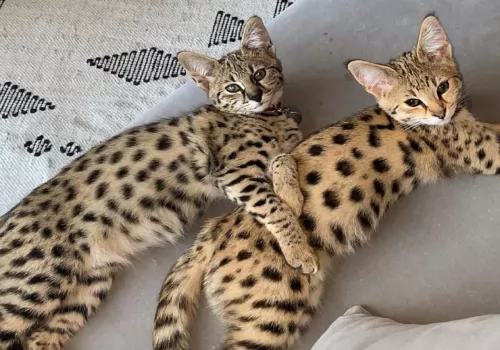 The Savannah cat's diet needs to be a high-quality type of food with efficient levels of protein and taurine. The reason for this is that all cats are carnivores. A properly balanced raw diet will be the best nutritionally balanced food you can provide.
The Savannah cat's diet needs to be a high-quality type of food with efficient levels of protein and taurine. The reason for this is that all cats are carnivores. A properly balanced raw diet will be the best nutritionally balanced food you can provide.
The Savannah has a short coat, which makes him low maintenance. He will still need to be brushed once a week. This will ensure a healthy sheen, and it will remove loose hairs and dust.
Provide for this intelligent cat’s physical and mental stimulation. He will need a variety of interactive toys. You yourself, need to become involved with your feline friend and give him a game too.
Make sure your Savannah is up-to-date with all his vaccinations. If you’re in any doubt about your pet’s health and wellbeing, get him to the vet who can provide you with valuable information on his health and his diet to ensure optimal health for your feline friend.
These are different cats to your regular domestic cat, and they will require different care. One of the things you need to do for a cat like this is provide it with an outdoor enclosure.
Because of their wild side, they are longing to be outdoors and you may find it difficult integrating such a cat into your home.
The Viverral needs plenty of exercise but you can’t just let them roam freely outdoors. Yes, you can train them to walk with a leash but you need to allow him outside in the enclosure. You can include a shallow paddling pool for him too.
These are active, intelligent cats and you will need to invest in some interactive toys for him to keep him amused.
You will need to supply this cat with a scratching post and a climbing tree. This is because as a cat, he is a natural climber and scratcher and he will need these in his life.
Ensure your feline pet has a nice warm, dry place to sleep.
Comparison with other breeds
- Savannah vs Abyssinian - Breed Comparison
- Savannah vs Aegean - Breed Comparison
- Savannah vs African Serval - Breed Comparison
- Savannah vs Chausie - Breed Comparison
- Savannah vs American Bobtail - Breed Comparison
- Savannah vs American Curl - Breed Comparison
- Savannah vs American Keuda - Breed Comparison
- Savannah vs American Longhair - Breed Comparison
- Savannah vs American Polydactyl - Breed Comparison
- Savannah vs American Shorthair - Breed Comparison
- Savannah vs American Wirehair - Breed Comparison
- Savannah vs Applehead Siamese - Breed Comparison
- Savannah vs Ashera - Breed Comparison
- Savannah vs Asian - Breed Comparison
- Savannah vs Asian Semi-Longhair - Breed Comparison
- Savannah vs Australian Mist - Breed Comparison
- Savannah vs Balinese - Breed Comparison
- Savannah vs Bengal - Breed Comparison
- Savannah vs Bicolor - Breed Comparison
- Savannah vs Birman - Breed Comparison
- Savannah vs Blue Russian - Breed Comparison
- Savannah vs Bombay - Breed Comparison
- Savannah vs Brazilian Shorthair - Breed Comparison
- Savannah vs Bristol - Breed Comparison
- Savannah vs British Longhair - Breed Comparison
- Viverral vs Abyssinian - Breed Comparison
- Viverral vs Aegean - Breed Comparison
- Viverral vs African Serval - Breed Comparison
- Viverral vs Chausie - Breed Comparison
- Viverral vs American Bobtail - Breed Comparison
- Viverral vs American Curl - Breed Comparison
- Viverral vs American Keuda - Breed Comparison
- Viverral vs American Longhair - Breed Comparison
- Viverral vs American Polydactyl - Breed Comparison
- Viverral vs American Shorthair - Breed Comparison
- Viverral vs American Wirehair - Breed Comparison
- Viverral vs Applehead Siamese - Breed Comparison
- Viverral vs Ashera - Breed Comparison
- Viverral vs Asian - Breed Comparison
- Viverral vs Asian Semi-Longhair - Breed Comparison
- Viverral vs Australian Mist - Breed Comparison
- Viverral vs Balinese - Breed Comparison
- Viverral vs Bengal - Breed Comparison
- Viverral vs Bicolor - Breed Comparison
- Viverral vs Birman - Breed Comparison
- Viverral vs Blue Russian - Breed Comparison
- Viverral vs Bombay - Breed Comparison
- Viverral vs Brazilian Shorthair - Breed Comparison
- Viverral vs Bristol - Breed Comparison
- Viverral vs British Longhair - Breed Comparison
 Petzlover
Petzlover Savannah cats have been bred to look like a Serval but it is essentially a domestic cat. The first Savannah cat was born in the United States in April 1986. The person who was successful in making this happen was Judee Frank.
Savannah cats have been bred to look like a Serval but it is essentially a domestic cat. The first Savannah cat was born in the United States in April 1986. The person who was successful in making this happen was Judee Frank. The Savannah Cat is a fairly large cat that weighs anything from 3 to 8 kg. It is a cross between a domestic cat and one of Africa’s smaller wild cats, the Serval.
The Savannah Cat is a fairly large cat that weighs anything from 3 to 8 kg. It is a cross between a domestic cat and one of Africa’s smaller wild cats, the Serval. The Savannah cat's temperament is exceptional, and when you’ve got a Savannah in your home, you’ve got a true companion.
The Savannah cat's temperament is exceptional, and when you’ve got a Savannah in your home, you’ve got a true companion. The Savannah is generally a healthy cat. The cat can also fall prey to some of the typical cat illnesses there are -
The Savannah is generally a healthy cat. The cat can also fall prey to some of the typical cat illnesses there are - The Savannah cat's diet needs to be a high-quality type of food with efficient levels of protein and taurine. The reason for this is that all cats are carnivores. A properly balanced raw diet will be the best nutritionally balanced food you can provide.
The Savannah cat's diet needs to be a high-quality type of food with efficient levels of protein and taurine. The reason for this is that all cats are carnivores. A properly balanced raw diet will be the best nutritionally balanced food you can provide.